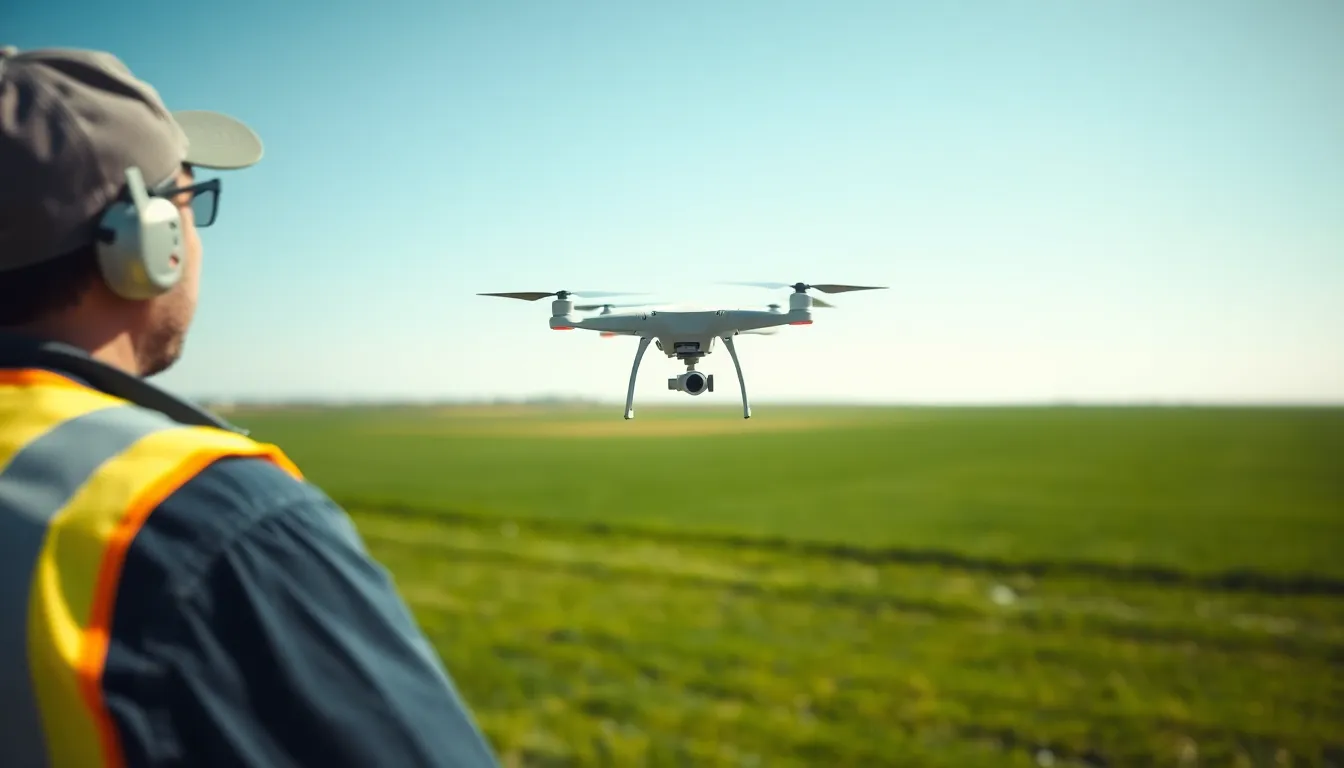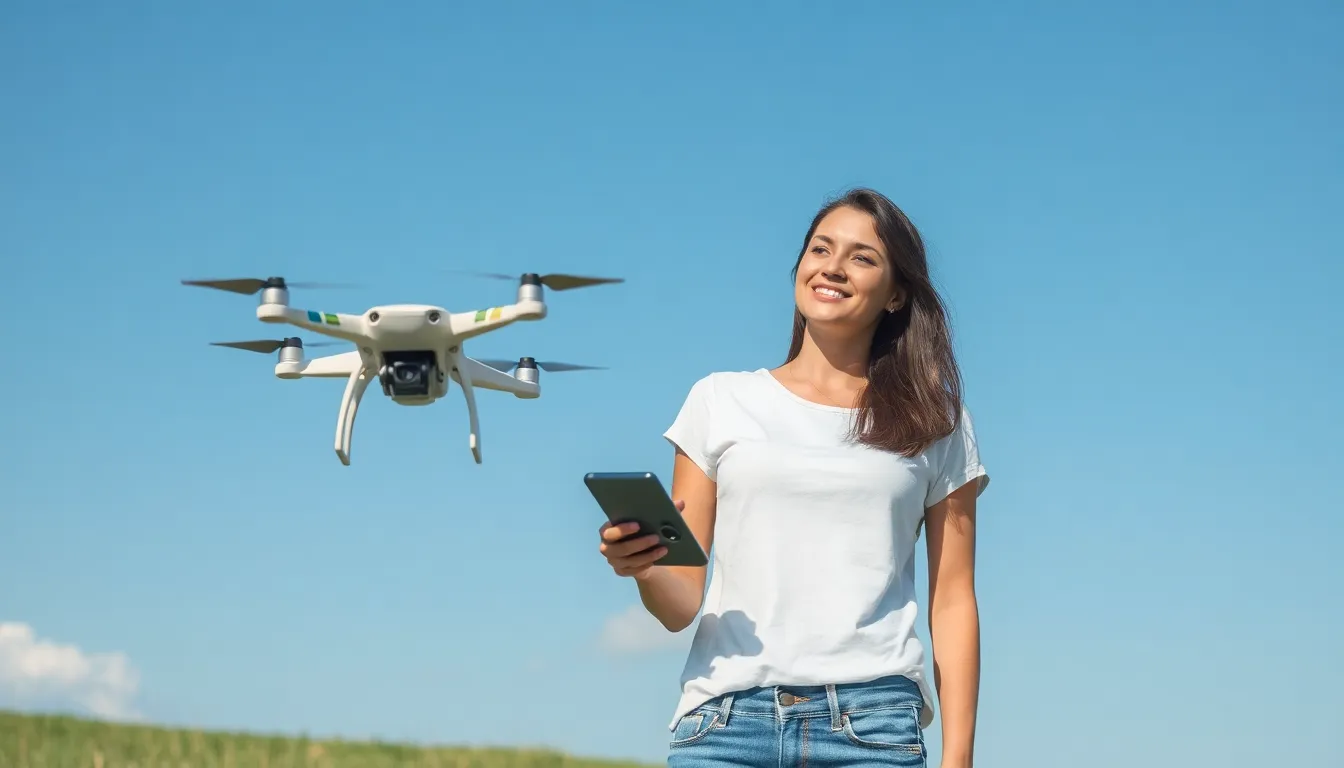In a world where drones are the new superheroes of the skies, navigating the maze of licensing requirements can feel like trying to fly a kite in a tornado. Whether someone’s a hobbyist capturing stunning landscapes or a professional filmmaker aiming for the next blockbuster, understanding drone licensing is crucial. After all, nobody wants to end up on the wrong side of the law—unless they’re auditioning for a reality show.
Table of Contents
ToggleOverview of Drone Licensing Requirements
Drone operators must adhere to specific licensing requirements, which vary by country and region. In the United States, the Federal Aviation Administration (FAA) oversees these regulations. Operators flying drones for commercial purposes must obtain a Remote Pilot Certificate, which requires passing the FAA’s Part 107 knowledge test.
Individuals flying drones for recreational use do not need a license but must follow the FAA’s guidelines. For hobbyists, registration is necessary if the drone weighs more than 0.55 pounds. This involves providing personal information and paying a registration fee of $5, covering a three-year period.
Compliance with local laws is crucial. Various states and municipalities impose their own regulations regarding drone use. Checking these regulations before flying helps prevent legal issues.
Training often plays a significant role in drone licensing. Courses are available that cover regulations, safety procedures, and operational best practices. Many pilots choose to enroll in these courses to prepare for the knowledge test.
Understanding the airspace is vital for safe drone operation. The FAA categorizes airspace into classes, each with specific rules for drone operations. Class G airspace generally allows for more freedom, while controlled airspace requires prior authorization.
Safety protocols must also be observed. Operators should maintain visual line of sight, avoid flying over people, and operate only during daylight hours unless equipped with appropriate lighting.
Awareness of international regulations is important for global drone flights. Countries like Canada and those in Europe enforce different rules that may require additional licensing or documentation.
Importance of Drone Licensing

Drone licensing ensures safe and responsible operations. Compliance with regulations fosters public trust and reduces accidents.
Safety Considerations
Safety remains a primary concern for drone operators. Recognizing risks enhances the ability to avoid accidents. Operators must maintain a visual line of sight during flights. Regulations specify avoiding populated areas and sensitive locations. Proper training equips pilots with knowledge on safe operational practices. It also reinforces understanding of emergency protocols. Drones can cause injuries or property damage if mishandled. Awareness of airspace restrictions protects both the pilot and bystanders. Prioritizing safety through licensing plays a critical role in minimizing hazards.
Legal Implications
Legal ramifications can arise from non-compliance with drone regulations. Operating without a valid license may lead to fines or legal sanctions. The FAA enforces strict guidelines for commercial operators. Registration for recreational drones is mandatory for those exceeding 0.55 pounds. Local laws might impose additional limitations, further complicating compliance. Failure to follow these regulations often results in legal disputes or liability issues. Operators must stay informed about international regulations when flying abroad. Navigating legal complexities becomes easier with appropriate training and awareness. Understanding these legal obligations is essential for successful drone operations.
Types of Drone Licenses
Understanding the types of drone licenses is crucial for anyone engaging in drone operations. These licenses fall into two main categories: commercial and recreational.
Commercial vs. Recreational Licenses
Commercial licenses are mandatory for operators using drones for business purposes. To obtain this license, pilots must achieve a Remote Pilot Certificate issued by the FAA, demonstrating knowledge through the Part 107 test. Recreational licenses, however, do not require formal certification; hobbyists only need to register drones exceeding 0.55 pounds. Adhering to FAA guidelines remains essential for both groups, particularly regarding airspace classification and safety protocols.
Specific Certifications and Endorsements
Specific certifications can enhance a pilot’s qualifications. For example, the FAA offers various endorsements for advanced operations, such as flying at night or beyond visual line of sight. Pilots pursuing these endorsements must complete training and pass additional tests. Such certifications improve operational capabilities while ensuring adherence to safety regulations. Staying informed about these options helps pilots maximize their skills and maintain compliance.
Steps to Obtain a Drone License
Acquiring a drone license involves several key steps from application to test preparation. Each step is crucial for ensuring compliance and operational safety.
Understanding the Application Process
Understanding the application process for a Remote Pilot Certificate is essential. The FAA requires applicants to complete a specific form known as the FAA Form 8710-13. Applicants must also provide identification, which can include a government-issued ID. After submitting the application, a background check is initiated by the Transportation Security Administration (TSA). Once cleared, the applicant can proceed to schedule their knowledge test. Familiarity with the required documentation helps streamline the application.
Preparing for the Knowledge Test
Preparing for the knowledge test demands focused study and practice. The FAA recommends reviewing the Remote Pilot – Small Unmanned Aircraft Systems Study Guide, which outlines the topics covered on the test. A variety of online courses and practice exams are available, allowing candidates to gauge their understanding. Exam topics include airspace regulations, aircraft performance, and emergency procedures. Joining study groups can also enhance retention and comprehension of the material. Candidates can ensure readiness by dedicating time to these resources.
State and Local Regulations
Navigating state and local drone regulations is essential for compliance and safe operations. Every state in the U.S. can establish specific rules regarding drone usage, which may include restrictions on flight areas and altitude limits. Local municipalities often add their own regulations, including required permits for flying in certain zones.
Understanding these diverse regulations fosters responsible flying practices. For instance, some cities prohibit drone flights over parks or public events, while others may restrict operations near critical infrastructure like airports or emergency response sites. Pilots must check regulations before launching, especially in urban environments.
Consulting local government websites or aviation authorities provides clarity on specific laws. Many states also require drone operators to register with local agencies, facilitating accountability and safety oversight. In some instances, additional training or certification may be necessary for specific drone applications like aerial photography or inspections.
Awareness of local ordinances can prevent fines or legal challenges. Many operators experience complications simply due to unawareness of regulations. Researching both state and local rules ensures pilots remain compliant and informs them of their rights and responsibilities as drone operators.
Joining local drone clubs or organizations often helps pilots navigate these regulations more effectively. These groups frequently host workshops that cover local laws, best practices, and safe flying techniques. Engaging with the community promotes collaboration and shared knowledge among operators.
Adhering to both federal and local regulations enhances public trust in drone technology. Compliance not only protects individuals but also supports the wider acceptance of drones for various applications. Educated drone pilots contribute to a safer and more organized airspace, exemplifying responsible use of this advancing technology.
Navigating drone licensing requirements is vital for both hobbyists and professionals. Compliance not only ensures legal operation but also promotes safety and responsibility in the skies. By understanding the different regulations at federal, state, and local levels, drone operators can avoid potential legal issues and contribute to a safer airspace.
Investing time in training and staying informed about evolving regulations enhances a pilot’s skills and operational capabilities. Whether pursuing a Remote Pilot Certificate or adhering to recreational guidelines, knowledge is the key to successful drone operations. Embracing these responsibilities fosters public trust and encourages a culture of safe flying.



